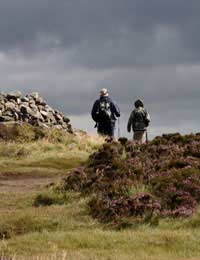Hiking for Older People

The wonderful thing about hiking is that anyone can do it. As long as you can walk (although you do see parents carrying babies in special backpacks) you can take part in it. It’s excellent exercise, and getting out into the country can be the perfect way to refresh the spirit.
As we age, though, it often happens that we can’t do quite all the things we did before. Not always, of course, but it really pays to be more aware of our limitations.
What Should Older People Do
In many cases, growing older makes very little difference to what we can do, especially in terms of walking. If a person is in good health, especially with no leg or hip problems, and has been hiking for years, then the chances are they can continue as before unless any medical problems develop.Common age related problems are with knees, legs, or other parts of the body, meaning we simply can’t be the people we were at 40. That’s why it’s important to talk to your GP about any limitations they might place on you.
Much advice is simply good sense. Hills, especially rough trails, can become more of a problem for older people, so making sure that you’re walking is on flatter paths is quite self-evident. The same applies to distance; you might not be as comfortable covering as many miles as before.
While many walk for exercise, it’s worth remembering that it’s never good to overdo exercise. It’s also supposed to be fun. Pushing yourself to your very limits is going beyond enjoyment.
Although rambling can be enjoyed alone as a way to appreciate the countryside and indulge in some contemplation, it can also be great fun in groups. There are many, all over the country, some of them geared towards older people, others catering for all age groups, with walks planned to suit everyone. The social aspect can often enhance time spent rambling.
Getting The Most Out Of Walking
Planning is important. Be sure you have a route and distance that’s comfortable for you, one you can not only accomplish without feeling drained afterwards, but also enjoy while you’re doing it.Walking regularly, even if it’s just for 20-30 minutes a day in your neighbourhood, will help keep you in good shape. As long as you can manage it, it’s something that’s advisable for everyone at least three times a week. It also prepares you for longer rambles on the weekend, or whenever you have the time.
Just like anyone else, be sure you have the appropriate clothing and footwear – a good pair of boots is essential. You also need to be very aware of keeping yourself hydrated, so carry plenty of water.
Don’t be afraid to break up the walk and take a break if you’re feeling a little tired. It’s not a contest, so stop when you feel like it, rest and drink in the view. Similarly, if you have a day when you don’t feel up to it for whatever reason, don’t force yourself; there will be other opportunities.
You know yourself and your body; listen to what it tells you. If you haven’t been hiking before and you’re planning on starting, see your GP first, especially if you have any medical conditions. As long as everything is fine, get out there and enjoy yourself!
- The Best Hiking Snacks
- Avoiding Leg Cramps When Walking
- Walking for Physical Rehabilitation
- How to Prepare for the Hiking Season
- Walking for Fitness: A Plan
- Fell Running: Is it for You?
- What is SwimHiking?
- Walking on Roads
- A Solo Walking Guide
- How To Avoid Blisters When Hiking
- General Health And Safety When Walking
- What to do in an Emergency
- Walking for Health
- Walking Injuries
- How to Prevent Walking Injuries
- How To Take Care Of Your Feet When Hiking
- Nutrition for Walking


Re: Walking on Roads
I have never attempted any form of hiking. This year i am 87, I’m pretty’s fit, I walk with dog between five and. Six miles every day, summer and…
Re: Starting a Walking Club
Hi I'm a naturist from North Wales and wanted to reach out to people that would like to join a clothing optional walk what's the best way…
Re: Starting a Walking Club
Do I need insurance for a walk/run group?. It’s a completely free group so no joining fee or charges. It’s run by volunteers. I don’t…
Re: Join A Walking Club
I need to hike...do something for my self...I love the outdoors and hiking...I need to meet new friends...who injoys the outdoors like…
Re: Starting a Walking Club
What sort of paperwork/ registration/ insurance might you need for walking group?
Re: Join A Walking Club
Hi, Any advice on liability/protecting yourself when setting up a walking club? What if someone hurts themselves? Thanks, Sam
Re: Starting a Walking Club
Hello, Do you know of any software that facilitates putting together walking/hiking clubs programme schedule? I am looking for…
Re: Join A Walking Club
I am looking to join a walking/hiking club in the Southampton/Hampshire area. I am 50 and have signed up for London to Brighton Challenge and…
Re: Join A Walking Club
Looking for a short walk partner n to make friends in tipton area of west midlands
Re: Join A Walking Club
Hi I am 33 and am looking to join a walking club for health and social reasons. I currently live in huntingdonshire.